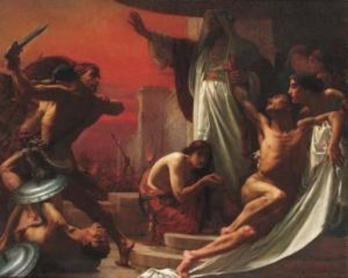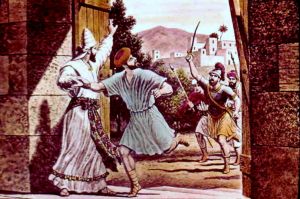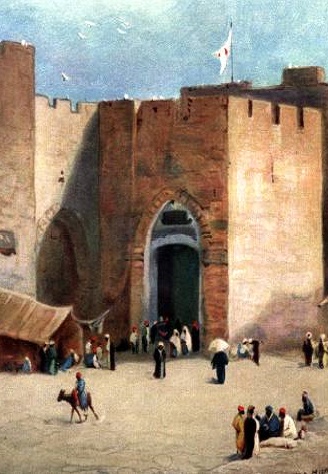 The cities chosen as Cities of Refuge were Kedesh of Galilee in the hill country of Naphtali; Shechem, in the hill country of Ephraim; and Kiriath-arba (also known as Hebron) in the hill country of Judah. The Lord also instructed that three cities be set aside for this purpose on the east side of the Jordan River, across from Jericho. They were Bezer, in the wilderness of the land of the tribe of Reuben; Ramoth of Gilead, in the territory of the tribe of Gad; and Golan of Bashan, in the land of the tribe of Manasseh. These Cities of Refuge were for foreigners living in Israel as well as for the Israelis themselves, so that anyone who accidentally killed another man could run to that place for a trial and not be killed in revenge. –Joshua 20:7-9 Living Bible (TLB)
The cities chosen as Cities of Refuge were Kedesh of Galilee in the hill country of Naphtali; Shechem, in the hill country of Ephraim; and Kiriath-arba (also known as Hebron) in the hill country of Judah. The Lord also instructed that three cities be set aside for this purpose on the east side of the Jordan River, across from Jericho. They were Bezer, in the wilderness of the land of the tribe of Reuben; Ramoth of Gilead, in the territory of the tribe of Gad; and Golan of Bashan, in the land of the tribe of Manasseh. These Cities of Refuge were for foreigners living in Israel as well as for the Israelis themselves, so that anyone who accidentally killed another man could run to that place for a trial and not be killed in revenge. –Joshua 20:7-9 Living Bible (TLB)
BEZER: The Fourth “City of Refuge”
Bezer -was situated beyond the Jordan, in the tribe of Reuben. Although its precise site has not been discovered, we may infer that it was perched on one of the many rocky heights among the mountains of Abarim, –perhaps a spur of the great mount Nebo, from whose summit Moses was permitted, before death, to get a view of the Land of Promise.
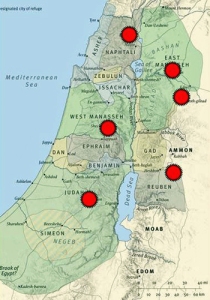 The northern portion of the waters of the Dead Sea would be seen from it, and the pastoral mountains of Judah in the distance. From its name, as well as from its being a border town, and subject to attack from the warlike tribe of Moab. Bezer would probably be strongly fortified –similar, perhaps, in this respect to the towns in the neighbourhood, with which the Israelites were so struck on their first approach to Canaan, with “their walls great and high, reaching to heaven.”
The northern portion of the waters of the Dead Sea would be seen from it, and the pastoral mountains of Judah in the distance. From its name, as well as from its being a border town, and subject to attack from the warlike tribe of Moab. Bezer would probably be strongly fortified –similar, perhaps, in this respect to the towns in the neighbourhood, with which the Israelites were so struck on their first approach to Canaan, with “their walls great and high, reaching to heaven.”
What does the name Bezer tell of Christ?
It literally means, “Stronghold” or Rock. The sinner is in danger everywhere else, but in Jesus he is safe. He is invited to “turn to the stronghold” as a “prisoner of hope,” and once within its gates, “though a host encamp against him,” he need “fear no evil.”
What a mighty force does encamp against him! There is God’s Holy Law, with all its terrible threatenings and curses. But sheltered in the true Bezer he can triumphantly say, “It is God that justifieth: who is he that condemneth?”
There is Satan, with his artful wiles and countless temptations. He was once a bright angel himself. He knows what holiness and happiness is. But being now a wicked spirit, he would make others as wicked and unhappy as himself. He is spoken of in the Bible as “a strong man armed.” But Jesus is “stronger” than this strong man.
Jesus is the believer’s Bezer.
If you have fled for refuge to this great gospel Bezer seated within its secure bulwarks you can joyfully exclaim, “I will say of the Lord, He is my rock, and my fortress, and my deliverer; my God, my strength in whom I will put my trust; my buckler, and the horn of my salvation, and my high tower.”
There is your own Wicked Heart, -with its sinful thoughts, and vain imaginations, and deep corruptions” for a man’s “worst foes are often those of his own household. One of those heart-foes will tempt you to tell a lie; another to swear; another to be dishonest; another to be selfish; another to be passionate; another to be unkind. But He that is for you, is greater than they that are against you.
Safer than in any earthly castle, you can take up your warrior-song, “The name of the Lord is a strong tower: the righteousness runneth into it, and is safe.”
There are the Trials and Sorrows and Distresses of this world, “those things that cause sad hearts and tearful eyes. But that blessed Saviour is your Rock and Stronghold –“knows your sorrows,” for He felt them. He marks your tears, for He shed the same himself. Fleeing to this true Bezer in the time of affliction, you can dry your tears and sing, “God also will be a refuge for the distressed, a refuge in the time of trouble; and they that know thy name shall put their trust in thee.”
And there is Death, the last enemy of all. But even over this King of terrors and Terror of kings, you can shout in triumph from your Divine shelter, “0 death, where is thy sting, . . . Thanks be to God, who giveth me the victory through the Lord Jesus Christ.” And Jesus is a Stronghold for all. I have already spoken of the little children of old rushing to its gates,” infants smiling fearless in the Saviour’s arms. He combines the majesty of Deity with the tenderness of man. If He had been the great God alone, you might have been awed at the thought of going to Him.
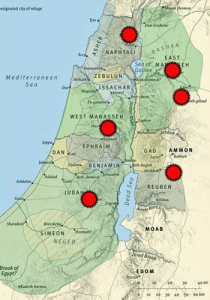 But what says the prophet Isaiah of this true Bezer?
But what says the prophet Isaiah of this true Bezer?
…”A MAN shall be as a hiding-place from the wind, and a covert from the tempest.” He Himself says in another scripture, “I will turn mine hand upon [for] the little ones.” In one of the great strongholds that were besieged in our last Indian Rebellion, Christian mothers were wont to hush their infants asleep by singing, “God is our refuge and strength, a very present help in trouble.”
My friends, “as one whom his mother comforts” so is God willing to “comfort you;” and here is a word of comfort: “The Lord is good, a STRONGHOLD in the day of trouble ” and he knows them that trust in him.”
In the old Cities of Refuge no weapons of any kind were allowed to be made.
Those who possessed them had to surrender them. This is true in a nobler and better sense regarding the Gospel Stronghold. There can be no deadly weapons forged there. Their edge is blunted: “There is now no condemnation to them that are in Christ Jesus.” Satan’s armoury has been plundered; the “Stronger than he” has “taken from him all his armour wherein he trusted, and divided the spoil.”
“Trust in the Lord forever; for in the Lord Jehovah is everlasting strength” (literally, “the Rock of Ages”).
——————————————-
Written by John Ross Macduff.
Published in 1865.
Edited for thought and sense.
———————————————–
Meet the author and part of your Christian heritage: John Ross Macduff (23 May 1818 – 30 April 1895) was a Scottish divine and a prolific author of religious essays. Born in Bonhard, Scone, Perthshire, Macduff was educated at the University of Edinburgh, and was ordained as minister of Kettins, a parish in Forfarshire in 1843. He returned to St Madoes, a parish in Perthshire in 1849, which he left to take charge of Sandyford, a new church in Glasgow. He preached there for fifteen years (until 1870), and then went to live in Chislehurst, Kent, in order to focus entirely on writing. His best known books were: “The Prophet of Fire”; “Memories of Bethany”: “Memories of Gennesaret”; “The Shepherd and His Flock “: “Sunset on the Hebrew Mountains “; “Comfort Ye”; “The Golden Gospel”; “Morning and Night Watches”; “The Bow in the Cloud”; “The Story of a Dewdrop”; and “The Story of a Shell.” Macduff died in Chislehurst.

